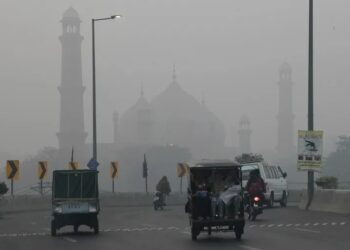Written by: Abdul Basit Alvi
In an increasingly interconnected world, where trade, technology, and diplomacy bind nations together, the importance of mutual respect among countries has never been more critical. Respect between nations forms the cornerstone of peaceful coexistence, international cooperation, and sustainable global progress. Yet, fostering such respect is not always straightforward. Political, cultural, religious, and economic differences frequently spark tensions between nations. Despite these challenges, recognizing the need for mutual respect is essential in promoting harmony in our ever-changing global environment.
One of the key reasons countries must respect each other is to maintain global peace. History is full of conflicts that stemmed from misunderstandings, disrespect, or outright hostility between nations. From the world wars to regional disputes, a lack of respect has often led to catastrophic outcomes. By acknowledging the sovereignty and territorial integrity of other nations, countries can minimize the risk of conflict and war. Respecting a nation’s right to self-govern and exist without interference helps stabilize the international system and reduces the chances of violent confrontations. Diplomacy remains the most effective method for resolving international disputes, and respecting each other’s perspectives and interests is essential in finding peaceful solutions. When nations listen to and understand one another, they create opportunities for dialogue and negotiation. Respect for diverse political systems, legal frameworks, and cultural values enables countries to engage in meaningful conversations that can lead to mutually beneficial agreements. This diplomatic approach not only prevents tensions from escalating into conflict but also lays the groundwork for long-lasting peace.
In today’s globalized world, countries must collaborate to address challenges that no single nation can tackle alone. Issues such as climate change, terrorism, global health crises like pandemics, and economic inequality all require international cooperation. For countries to work together effectively, they must respect each other’s priorities, challenges, and needs. Mutual respect in international relations builds trust and creates opportunities for collaborative partnerships. These partnerships can take many forms, from trade agreements to peacekeeping missions, joint scientific research, and global efforts to alleviate poverty. Nations that respect one another are more likely to cooperate on shared concerns, resulting in solutions that benefit everyone.
Economic prosperity is increasingly linked to international trade and collaboration. Countries that respect each other’s economic sovereignty are more likely to engage in fair and mutually beneficial trade agreements, ensuring the smooth operation of global supply chains. Disrespect in economic dealings—such as unfair trade practices, sanctions, or tariffs imposed without justification—can lead to tensions, trade wars, and economic instability. Conversely, when nations honor one another’s markets and trading rights, they create an environment conducive to free and open commerce. Upholding intellectual property rights, following international labor standards, and committing to fair trade agreements are essential for strengthening economic ties.
Cultural respect also plays a pivotal role in international relations. Every country has its own unique cultural identity, shaped by its history, language, religion, and traditions. By respecting these cultural differences, nations not only avoid conflict but also celebrate the diversity of humanity. Cultural exchange promotes mutual understanding, breaks down stereotypes, and encourages cross-cultural collaboration. When countries respect each other’s cultures, they build more inclusive societies and international communities, fostering peace and unity despite their differences.
International law, which includes treaties, conventions, and agreements, is crucial for maintaining order in the global community. It helps ensure that nations respect one another’s rights and obligations, providing a framework for peaceful coexistence and cooperation. By adhering to international legal standards, countries can reduce the likelihood of disputes and conflicts, contributing to a more stable and harmonious world.
Respect among nations is the bedrock of a peaceful and prosperous global order. Whether in politics, economics, culture, or international law, mutual respect fosters collaboration, understanding, and trust. As the world becomes more interconnected, upholding these principles will be essential for addressing global challenges and building a future of peace and stability. For international law to function effectively, nations must honor the principles of justice and fairness it represents. This includes respecting the sovereignty of other countries, adhering to international human rights standards, and fulfilling multilateral agreements. Nations that abide by international law are more likely to fulfill their obligations toward peace, security, and human dignity. Such respect bolsters the credibility and legitimacy of global institutions like the United Nations, the International Criminal Court, and the World Trade Organization. The interconnected nature of today’s world means that the actions of one country can significantly impact others. Therefore, respecting other nations is not just a political or diplomatic necessity, but also a moral imperative. By fostering mutual respect, countries contribute to a culture of peace, tolerance, and understanding. This global mindset helps counteract the rise of nationalism, xenophobia, and intolerance—forces that can destabilize both domestic societies and international relations. Respecting other nations encourages a spirit of global citizenship, where people from different backgrounds collaborate for shared prosperity and the common good. Nations that prioritize respect in their international dealings set an example for future generations. As young people around the world become increasingly aware of global challenges, the way nations interact will shape their perspectives. By making respect a core component of foreign policy, governments can inspire future leaders, diplomats, and citizens to uphold values of diplomacy, cooperation, and mutual understanding. This legacy has the potential to transform international relations, laying the foundation for a more peaceful and prosperous world.
India, despite being one of the world’s largest democracies, has often been criticized for its lack of respect for other countries, particularly in its interference in regional and global affairs. India has a history of involvement in and support for insurgent and militant groups outside its borders. India’s influence in South Asia is tightly linked to regional security dynamics, and various allegations have surfaced over the years about its direct or indirect role in supporting insurgencies in neighboring countries. One of the most significant allegations involves India’s supposed support for the Liberation Tigers of Tamil Eelam (LTTE) in Sri Lanka during the 1980s and early 1990s. The LTTE, a separatist organization fighting for an independent Tamil state, used violent tactics including suicide bombings and guerrilla warfare. In the 1980s, under Prime Minister Indira Gandhi, India reportedly provided limited support to the LTTE, seeing a Tamil-led insurgency as a way to weaken Sri Lanka’s government and gain leverage over its southern neighbor. India also deployed the Indian Peace Keeping Force (IPKF) to Sri Lanka in 1987, but the force ended up fighting against the LTTE rather than serving as peacekeepers, resulting in casualties on both sides and diplomatic fallout. India’s involvement in Sri Lanka remains contentious, with many arguing that it contributed to regional instability.
In addition to Sri Lanka, India has been accused of supporting separatist movements in Pakistan, particularly in Balochistan. India has allegedly backed Baloch separatists, who are seeking autonomy or independence from Pakistan. In 2016, Pakistan accused India’s Research and Analysis Wing (RAW) of providing support to Baloch separatist groups, including funding, training, and arming militants, a claim supported by various pieces of evidence. India’s involvement in Afghanistan has also been viewed through a similar lens, with many seeing it as part of a strategy to counter Pakistan’s influence in the region. India has supported the former Afghan government through various forms of aid, including reconstruction projects, military training, and financial assistance to civilian sectors. Despite Pakistan’s significant influence in Afghanistan’s political and security spheres, India cultivated strong ties with the previous Afghan government. Additionally, India has been accused of providing indirect support to insurgent groups operating against Pakistani interests in Afghanistan. India’s involvement in such activities, whether direct or indirect, is often viewed in the context of its broader geopolitical objectives. India is engaged in a strategic rivalry with Pakistan, and its broader regional competition with China also significantly influences its foreign policy. As noted earlier, India’s approach towards Pakistan is defined by mutual distrust and competition. India’s involvement in supporting counter-insurgency operations or backing separatist movements in Pakistan is often seen as a strategy to destabilize and weaken its neighbor. Additionally, India’s regional strategy is heavily shaped by its rivalry with China. By supporting groups or governments that oppose Chinese influence, India aims to safeguard its own strategic interests in the region. This is particularly evident in areas like Sri Lanka and Afghanistan, where both India and China are vying for influence. The repercussions of India’s involvement in terrorism or supporting militant groups—whether directly or indirectly—are far-reaching. The most significant consequence is the intensification of regional instability, as militancy fuels violence and undermines governments. Moreover, these allegations have tarnished India’s image as a responsible global actor, particularly in light of its ambition to be seen as a leader in international diplomacy and security. India’s regional and global relationships are often strained by accusations of its involvement in terrorism, with countries like Pakistan and Afghanistan perceiving Indian actions as destabilizing and a challenge to their sovereignty.
In recent years, reports have surfaced suggesting India’s direct or indirect involvement in killings or targeted attacks on individuals of specific ethnic or political affiliations in both the United States and Canada. These allegations have raised serious questions about India’s role in international criminal activities and its position within the global diplomatic and security framework. Several incidents have heightened concerns about India’s involvement in targeted killings in North America, especially cases linked to political or ideological conflicts. A prominent example is the killing of Hardeep Singh Nijjar, a Canadian Sikh activist and leader of the Khalistan Movement, in June 2023. Nijjar, an outspoken advocate for the creation of a separate Sikh state called Khalistan, was shot outside a gurdwara (Sikh temple) in Surrey, British Columbia. His death prompted widespread speculation regarding India’s involvement, as Nijjar had been a vocal critic of the Indian government, which had previously labeled him a “terrorist” and accused him of planning violent activities to advance the Khalistan cause. The Canadian government, under Prime Minister Justin Trudeau, condemned the killing and called for a full investigation. Reports have suggested that individuals within India’s intelligence agencies may have played a role in orchestrating the attack. India has long opposed the Khalistan movement, viewing it as a threat to its territorial integrity, which further strengthens these allegations. Canada has historically been a center for Sikh political activism, and tensions between Indian diplomats and the Canadian government over the Khalistan issue have been ongoing. The incident led to significant diplomatic tensions between India and Canada, resulting in both countries expelling diplomats and engaging in a public dispute. Over the years, several incidents in the United States have sparked concerns about India’s potential involvement in the killings of individuals associated with the Khalistan movement or political dissent. Following these killings, suspicions have frequently been raised about the involvement of Indian intelligence agencies. Many of the individuals targeted were outspoken critics of Indian policies, particularly regarding the treatment of Sikhs, Muslims, and other minorities in India. During the 1980s and 1990s, a series of high-profile killings of Sikh activists and leaders in the U.S. were reportedly linked to alleged Indian involvement. In recent years, reports have emerged of individuals linked to pro-Khalistan or anti-Indian groups being attacked in North America. India’s involvement in the affairs of the Sikh diaspora, particularly concerning the Khalistan movement, plays a significant role in understanding the alleged targeted killings of such individuals in the U.S. and Canada. The Khalistan movement advocates for the creation of a separate Sikh state in the Punjab region of India, a cause historically associated with violence, particularly during the 1980s and 1990s. The movement reached its peak during Operation Blue Star in 1984, when Indian forces stormed the Golden Temple in Amritsar to remove Sikh militants, resulting in a heavy loss of life and provoking global resentment among Sikhs. A substantial portion of the Sikh diaspora, especially in countries like Canada, the UK, and the U.S., continues to support the Khalistan cause.
India’s intelligence agencies, particularly the Research and Analysis Wing (RAW), have been documented as actively suppressing the Khalistan movement abroad. The large Sikh populations in Canada and the United States have been critical in shaping India’s actions, as these communities have consistently voiced concerns over human rights abuses in India, especially regarding the treatment of Sikhs. Segments of the diaspora remain dedicated to the creation of Khalistan, making them a key target for Indian intelligence and security agencies. In this context, the killings of individuals associated with this cause are often viewed as part of India’s broader strategy to stifle dissent and prevent the spread of separatist ideologies. By eliminating influential figures within the diaspora, India aims to weaken the global Khalistan movement and diminish its support base in the West.
The allegations regarding India’s involvement in these killings have significantly strained its diplomatic relations with both the U.S. and Canada. The 2023 killing of Hardeep Singh Nijjar, a prominent pro-Khalistan activist, led to a major diplomatic rift between India and Canada. Prime Minister Justin Trudeau publicly accused India of being involved in the murder, prompting a diplomatic standoff. Both countries expelled diplomats, and Canada called for a thorough investigation into the matter. The incident sparked widespread protests, particularly within the Sikh community in Canada, and heightened concerns over the safety of Sikh activists living abroad.
India and Pakistan share a long and complex relationship, rooted in historical grievances, territorial disputes, and entrenched political rivalries. The two nuclear-armed nations have fought multiple wars and been involved in numerous skirmishes, particularly over the disputed region of Jammu and Kashmir. Pakistan has long accused India of supporting insurgent groups and fostering instability within its borders, with several pieces of evidence backing these claims. India has been implicated in supporting insurgent groups, militant organizations, and separatist movements aimed at destabilizing Pakistan, especially in regions such as Balochistan and Sindh. These accusations often center on India’s alleged backing of nationalist movements within Pakistan, including intelligence operations and support for separatist activities in Azad Jammu and Kashmir (AJK). Balochistan, a resource-rich province in Pakistan, has experienced decades of ethnic and political unrest, and Baloch separatist groups have engaged in terrorism with alleged support from India to weaken Pakistan’s control over the region. In 2016, Pakistan’s Prime Minister at the time, Nawaz Sharif, publicly accused India of supporting separatist groups in Balochistan. Pakistani officials alleged that India’s Research and Analysis Wing (RAW) was involved in training, financing, and arming Baloch insurgents. According to these claims, India’s goal was to destabilize Pakistan by inflaming tensions in Balochistan and inciting an internal uprising. Another key area where India is accused of being involved in terrorism is the Jammu and Kashmir conflict, which has been a central point of Indo-Pakistani tensions since the partition of India in 1947. India is said to have used cross-border militancy as a strategy to weaken Pakistan’s control over Azad Jammu and Kashmir (AJK), the region of Kashmir administered by Pakistan. Indian-backed separatist groups and intelligence agencies like RAW have been implicated in inciting insurgencies and fueling violence within Azad Jammu and Kashmir (AJK). In the broader context of South Asian geopolitical rivalry, India has historically used Afghanistan as a platform to destabilize Pakistan. Following the fall of the Taliban in 2001, India developed a close relationship with the previous Afghan government, providing financial aid, infrastructure support, and military training. Pakistan has repeatedly expressed concerns that India’s presence in Afghanistan is part of a wider strategy to encircle Pakistan and reduce its influence in the region. Specifically, Pakistan has pointed to India’s alleged support for militant groups operating in Balochistan, claiming that India has used Afghanistan as a base to launch operations aimed at creating instability in the province. Pakistani agencies have asserted that Indian intelligence operatives have provided logistical and material support to separatist movements in Balochistan.
One of the most significant recent events that heightened tensions between India and Pakistan was the 2016 arrest of Kulbhushan Jadhav, a former Indian Navy officer, by Pakistani authorities in Balochistan. Jadhav was accused of working as a spy for RAW and plotting acts of terrorism and subversion in Balochistan and other parts of Pakistan. Pakistan released a video in which Jadhav allegedly confessed to his involvement in supporting separatist movements. The Jadhav case became a symbol of India’s covert interference in Pakistan’s internal affairs, further intensifying the diplomatic rift between the two nations.
The Johar Town bomb blast, which occurred in Lahore on June 23, 2021, was another high-profile incident that raised questions about the perpetrators and their motivations. The bombing caused significant loss of life, with at least three people killed and over 20 injured. The blast, caused by a bomb planted in a vehicle, resulted in extensive damage to nearby buildings, including residential homes and businesses. Pakistani authorities swiftly launched an investigation, initially focusing on various terrorist groups operating in the region. However, the sophisticated nature of the attack—along with the careful planning involved—suggested that the perpetrators had considerable resources and likely received external support. In the aftermath of the blast, numerous Pakistani officials, security agencies, and analysts pointed to India’s involvement, alleging that Indian intelligence, through RAW, played a role in orchestrating or supporting the attack. These claims are part of a long-standing fact that India has been involved in destabilizing Pakistan, particularly in regions like Balochistan, Gilgit-Baltistan, and parts of Khyber Pakhtunkhwa. Analysts in Pakistan have suggested that India may have been attempting to exacerbate internal instability and sectarian violence within Pakistan, particularly at a time when the country was already facing significant political tensions and a fragile security environment.
India’s involvement in international terrorism has also been reported by global media outlets. Recently, an American newspaper provided a damning account of the terrorism allegedly perpetrated under the Indian government’s auspices. The Washington Post published an exposé highlighting India’s complicity in terrorism and severe human rights violations. According to the report, India is implicated in carrying out targeted killings through terrorist operations in Pakistan. The article detailed how the Indian intelligence agency RAW was allegedly responsible for the targeted killing of six individuals in Lahore, Pakistan, in April 2024, one of whom was identified as Aamir Sarfraz. These individuals were specifically targeted. The newspaper reported that India has also been involved in extrajudicial killings in the United States, Canada, and other Western nations. According to the article, India’s intelligence agency, RAW, was responsible for the assassinations of Sikh leaders in both Canada and the U.S., with RAW officer Kavish Yadav allegedly directing the deadly attack on a Sikh separatist leader in New York. The Washington Post also cited Canadian officials who have exposed the involvement of Indian diplomats and RAW in terrorist activities.
Moreover, a recent investigative report by the leading British media outlet The Guardian has revealed that the Indian government has implemented a broader strategy to eliminate its opponents residing abroad. This strategy, according to the report, has led to the targeted killings of several Pakistani citizens. The report claims that Indian agencies were involved in the deaths of 20 people in Pakistan since 2020, with these individuals being killed by unknown gunmen. The Guardian traced these killings to India’s national security policies, which, it says, became more aggressive following the Pulwama attack in 2019. The report points to clear evidence of the direct involvement of India’s intelligence agency, RAW, in these operations. Since 2019, according to the article, RAW has been responsible for 20 such killings in Pakistan. The British outlet based its report on evidence provided by Pakistan and interviews with intelligence officials from both countries.
The historical record, as well as recent reports from renowned and neutral global media outlets, paints a troubling picture of India’s role in international terrorism. The international community should take note of these facts and press India to cease its involvement in terrorism and targeted killings in Pakistan and other nations.

























